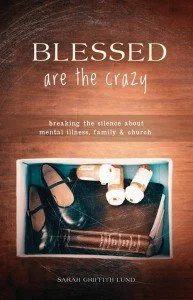Breaking the Silence about Mental Illness in the Church
08-03-2015
By Rev. Sarah Griffith Lund
Growing up with a father, brother, and cousin with mental illness, Rev. Dr. Sarah Lund speaks with passion and compassion about those struggling with the disease and their families. Rev. Lund, a 2011 McCormick DMin. Alum and vice president of Seminary Advancement for Christian Theological Seminary in Indianapolis, was one of the many leaders who participated in McCormick’s Mental Health Forum for Lay Leaders, Clergy, and Mental Health Professionals.
The forum, comprised of individuals with personal experience with mental illness, professionals with backgrounds in theology, psychiatry, and psychology, came together for two days in May, 2015 to shed light on this condition and build support for those suffering from mental illness and their families.
“My family was faithful and active in the church where I grew up,” says Rev. Lund, author of Blessed are the Crazy: Breaking the Silence about Mental Illness, Family, and the Church, “but we never shared with our church family our struggles with mental illness. We isolated ourselves and that excluded us from needed support. I don’t think we were any different from other families back then. We didn’t feel that the church was a safe place to talk about mental illness without being judged.”
As with many diseases, mental illness carries a stigma that can make it difficult for individuals and families to speak about it with others. Yet, according to the National Alliance on Mental Illness, one in four adults and approximately 20 percent of children ages 13 to 18 experience severe mental disorders within a given year, and one in 17 adults live with a serious mental illness (such as schizophrenia, major depression, or bipolar disorder).
“Prayer and Scripture reading are great aids to anyone’s mental health,” says Rev. Lund, “and there are therapies, counseling, and medication for those who need it. Our mental health informs our image of God and how we experience our Creator. As we learn to support individuals and families who are managing this disease, we help them enjoy more of Christ’s love and grace that is extended to us all.”
Rev. Sarah Griffith Lund earned her Bachelors degree at Trinity University, her MDiv. From Princeton Theological Seminary, her MSW from Rutger’s University, and her DMin. From McCormick Theological Seminary. She was ordained into ministry through the Christian Church (Disciples of Christ), and now serves as the Vice President for Seminary Advancement at Christian Theological Seminary in Indianapolis. You can read more about her work and reflections on her website: www.sarahgriffithlund.com.
Rev. Lund reflects on her own experiences of Mental Illness and the Church in her book, published in 2014




